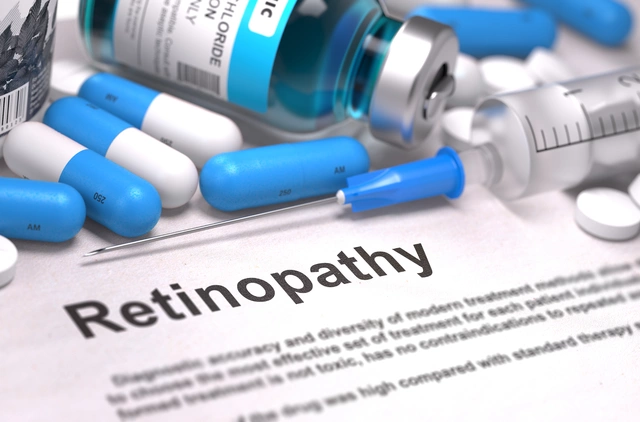Understanding Chronic Hepatitis B: The Basics
Chronic Hepatitis B is a viral infection that affects the liver and can lead to severe consequences if not diagnosed and treated appropriately. This infection can be asymptomatic or mildly symptomatic, making it a challenge to diagnose in its early stages. Furthermore, the virus can affect people differently, with some individuals experiencing severe symptoms and complications, while others seem to be relatively unaffected.
Before delving into the challenges of diagnosing chronic Hepatitis B, it's essential to understand the basics of the infection. Hepatitis B is caused by the Hepatitis B virus (HBV), which is transmitted through contact with infected blood, semen, or other bodily fluids. It can be acquired through unprotected sex, sharing needles, or from an infected mother to her baby during childbirth. The acute phase of the infection usually resolves within six months, but in some cases, the virus continues to be present in the body, leading to chronic infection.
Why Diagnosing Chronic Hepatitis B Is Challenging
One of the most significant challenges in diagnosing chronic Hepatitis B is the lack of symptoms in many individuals. The virus can persist in the body for years without causing noticeable symptoms, which means that many people are unaware of their infection. This is particularly concerning as untreated chronic Hepatitis B can lead to severe complications such as cirrhosis, liver failure, and liver cancer.
Additionally, the symptoms of chronic Hepatitis B can be similar to those of other conditions, making it difficult to differentiate between them. For example, symptoms such as fatigue, joint pain, and abdominal discomfort can be attributed to other illnesses or even dismissed as stress or the natural aging process. This makes it essential for healthcare providers to be vigilant in their assessment and screening for Hepatitis B, particularly in high-risk populations.
Initial Screening for Hepatitis B
The first step in diagnosing chronic Hepatitis B is to conduct an initial screening, which typically involves a blood test to detect the presence of Hepatitis B surface antigen (HBsAg). This test can identify both acute and chronic HBV infections. If the test is positive, further testing is needed to determine whether the infection is acute or chronic, as well as to assess the severity of the disease.
It's important to note that false-negative results can occur in the initial screening, particularly in individuals with a weakened immune system or those who have been recently infected. This is another challenge in diagnosing chronic Hepatitis B, as it requires healthcare providers to maintain a high degree of suspicion and potentially repeat testing at a later time.
Additional Testing for Chronic Hepatitis B
If the initial screening is positive for HBsAg, additional tests are necessary to confirm a chronic Hepatitis B diagnosis and determine the severity of the infection. These tests may include:
- Hepatitis B e-antigen (HBeAg) and Hepatitis B e-antibody (anti-HBe) tests: These tests provide information on the replicative status of the virus and can help guide treatment decisions.
- Hepatitis B virus DNA (HBV DNA) test: This test measures the amount of viral DNA in the blood, which can help determine the level of viral activity and the risk of liver damage.
- Liver function tests: These tests assess liver damage and can help monitor the progression of the disease.
- Liver biopsy: In some cases, a liver biopsy may be recommended to assess the extent of liver damage and guide treatment decisions.
Importance of Early Diagnosis and Regular Monitoring
Given the challenges in diagnosing chronic Hepatitis B, it's crucial to identify and treat the infection as early as possible to prevent severe complications. Regular monitoring of individuals with chronic Hepatitis B is essential to assess the progression of the disease and adjust treatment as needed.
Furthermore, raising awareness about Hepatitis B and the importance of regular screening, particularly in high-risk populations, is vital to ensure that those living with the infection can receive appropriate care and treatment. By being proactive in our approach to diagnosing and managing chronic Hepatitis B, we can ultimately help improve the lives of those affected by this potentially life-threatening infection.


They act like HBV is some secret conspiracy when it's been documented since the 70s. People die because they wait for symptoms instead of getting tested. If you're not getting screened if you're high-risk, you're playing Russian roulette with your liver.
They’re hiding the truth. Big Pharma doesn’t want you to know HBV can be cured with garlic and sunlight. Why do you think they push expensive antivirals? The real cure is in the earth, not in a pill. They test you for HBsAg to track you, not to help you.
USA and UK think they own medicine. In Nigeria we test every newborn and track every case. You guys let people die because you're too lazy to screen. We don't wait for symptoms. We don't wait for permission. We act.
Screening is the only ethical response. Asymptomatic doesn't mean harmless. The virus doesn't care if you feel fine. It's replicating. It's destroying. Testing isn't optional. It's basic hygiene for your liver.
i just found out my cousin has it and never knew... she's 32 and felt fine. now she's on meds and scared. why isn't this just part of regular bloodwork like cholesterol? i feel so bad for her
MY MOM GOT DIAGNOSED AT 58 AFTER 20 YEARS OF 'JUST TIRED' AND 'STRESS'. THEY SAID IT WAS DEPRESSION. IT WAS HBV. SHE NEARLY DIED. NOW SHE'S ON A LIFETIME MEDS REGIMEN. DON'T IGNORE THE SIGNS. THIS ISN'T A DRAMA, IT'S A LIFESAVING MOMENT.
If you're from India or Africa or any place with high prevalence, you get tested at birth. No excuses. No waiting. No 'maybe next year'. You don't get to be ignorant when your community is at risk. Get tested. Period.
I didn't know how common this was until I started volunteering at the free clinic. So many people think they're fine because they're not jaundiced. But the damage is silent. It's heartbreaking to see someone in their 40s with cirrhosis because they never got a simple blood test.
My uncle had HBV for 30 years and never knew. He got diagnosed after a routine checkup for back pain. Now he's doing great on treatment. The point is - if you’ve ever had a blood transfusion, shared needles, had unprotected sex, or were born to a mother from an endemic area - get tested. It’s five minutes and could save your life.
HBsAg test is cheap, fast, and covered by insurance. If you're over 18 and haven't been tested, you're negligent. No one’s saying you have it - but if you don’t get tested, you’re gambling with your liver, your family, and your future. Get the test. Do it today.
HBV is a bioweapon. They use it to depopulate the underclass. The CDC knows. The WHO knows. That’s why they push screening - to identify targets. The real cure? Immunity through exposure. But they won’t tell you that. They want you dependent on antivirals.
Why are we even talking about this? 😴 Just eat turmeric and drink lemon water. You don't need tests. You need vibes. 🌿✨
Let’s be real - in the U.S., if you’re poor, Black, Latino, or from Southeast Asia, you’re statistically more likely to have HBV and less likely to get screened. We call it 'health equity' but it’s just systemic neglect wrapped in medical jargon. We need community outreach, not just lab tests. We need trust. We need people who look like you telling you to get checked - not some white doctor in a sterile office.
Testing is a scam. If you’re healthy, you don’t need it.
I’m from the UK and we’ve made huge progress with HBV screening in maternity care - every pregnant woman gets tested. That’s how we cut mother-to-child transmission by 95%. It’s not magic. It’s policy. We didn’t wait for symptoms. We didn’t wait for outrage. We just did the right thing. Other countries can too.
Everything is a metaphor. The liver is the soul. HBV is just a reflection of your emotional blockage. 🌊